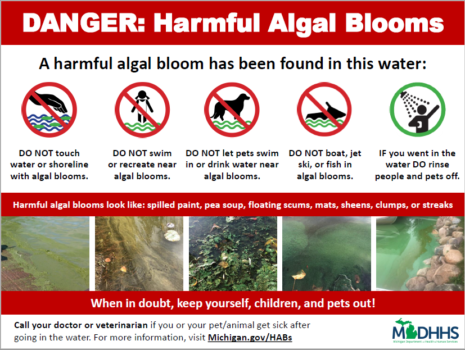August 16, 2022 – Wakefield, MI – The beach at Sunday Lake in Wakefield has been closed for swimming due to the presence of a harmful algal bloom. The Western Upper Peninsula Health Department (WUPHD) staff observed the algal bloom while conducting weekly beach monitoring for E. Coli. Samples taken on August 15 were positive for microcystin, an algal toxin released by some types of algae in lakes or rivers. The test result was over the EPA recreational limit. Additional testing will take place this week to ensure the bloom is dissipating.
Summer is peak season for the formation of harmful algal blooms (HABs) that can present health hazards to people and pets. In Michigan, algal blooms typically occur during periods of warm temperatures, lots of sun, and high nutrient levels. These blooms can last a few days, weeks or longer. “Algae blooms look like a green mat right on top of the water or spilled green paint”, stated Tanya Rule, Environmental Health Director for WUPHD. “The algal toxins that are released can be harmful to aquatic life, pets, and humans so it is very important to avoid these areas.”
Below are some steps to take when near waterways:
- Avoid direct contact with waterways that appear to be scummy or have a green shade to them
- Do not drink untreated surface water
- Obey posted signs for public health advisories and/or beach closings
- Limit or avoid eating fish from algal bloom impacted areas
Contact with algae blooms can cause minor illness in humans. People can experience the following symptoms after exposure to algae blooms:
- Rash, hives, or skin blisters at skin contact site
- Runny eyes and/or nose, sore throat, asthma-like symptoms, or allergic reactions
- Diarrhea, vomiting, abdominal pain, weakness, tingly fingers, numbness, dizziness, difficulty breathing, or even death resulting from ingesting contaminated water.
If you think you have been exposed to algae blooms, take the following precautions:
- Immediately remove yourself from the area
- Take a shower and thoroughly rinse off with clean, fresh water if they swam in an area with algae blooms.
- Seek medical treatment if you have ingested contaminated water.
Contact with algae blooms can be fatal to pets. Keep pets from drinking or playing in the lake water. Symptoms of illness from cyanotoxins often appear quicker in animals than in humans – sometimes in minutes to a few hours. Symptoms in animals can include vomiting, diarrhea, fatigue, staggered walking, excessive salivation, convulsions, erratic behavior, or physical distress. Dogs should be thoroughly rinsed off or bathed with fresh water after contact with water that may contain algae, even if it’s not toxic algae. Seek veterinary treatment for your pet as soon as possible if you think your pet may have been exposed to or ingested algal toxins.
Additional information is available at the www.michigan.gov/habs. Suspicious-looking algae can be reported to EGLE by calling the Environmental Assistance Center at 1-800-662-9278 or sending an e-mail to AlgaeBloom@Michigan.gov.

